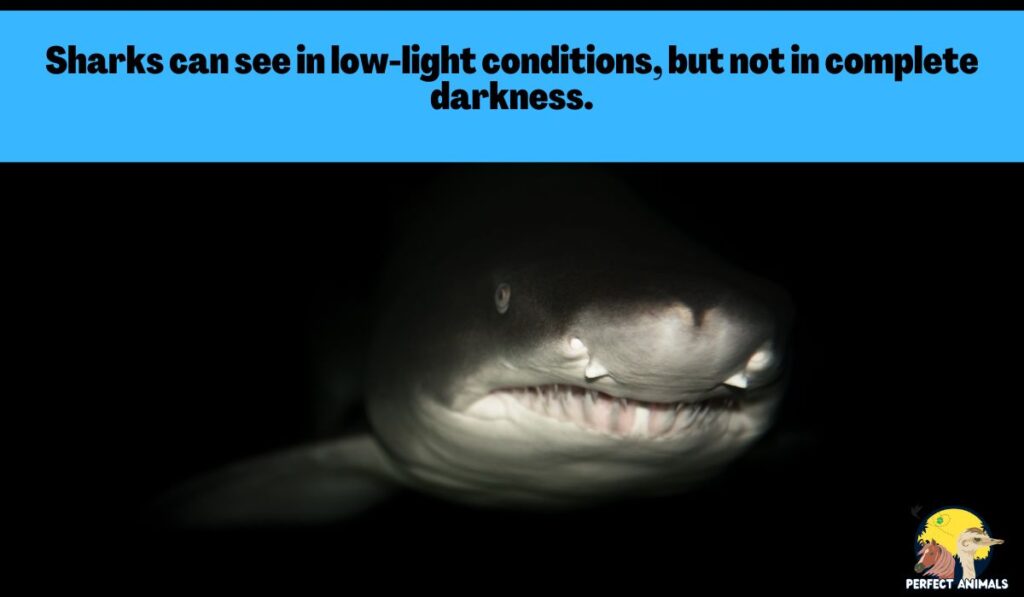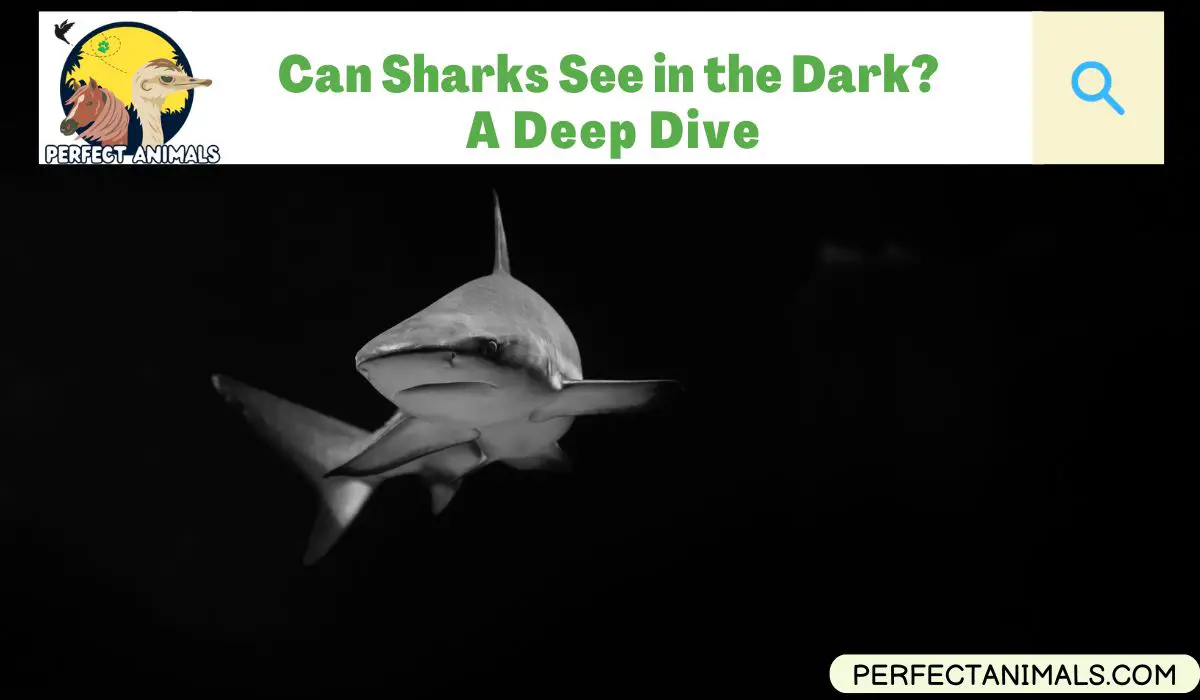Sharks are incredible ocean predators that have thrived for millions of years thanks to their amazing senses, especially vision.
As mostly nocturnal hunters, sharks have evolved unique eyes and visual systems to see, track, and capture prey in low light or even completely dark waters.
In this article, we’ll explore shark eyesight and visual capabilities.
Can sharks see in the dark? How does their vision compare to humans? Do aging sharks experience any changes in eyesight?
We’ll cover all of this and more about how sharks use vision to be such effective hunters.
Understanding how sharks have adapted to thrive in the ocean at night can also give us insight into these majestic creatures.
So let’s dive right in and shed some light on sharks and their ability to see in the dark!
Are Sharks More Active At Night?
Many shark species are generally more active at night compared to during the day.
This nocturnal activity pattern likely developed to take advantage of vulnerable prey that is also more active in darker waters.
Here are some key reasons sharks tend to be more active when the sun goes down.
- Avoid competition from other daytime predators like large bony fishes that may steal prey or be a threat to young sharks.
- Access prey species like squid and small fish that migrate toward the surface at night.
- Using the cover of darkness to ambush prey and remain camouflaged until the last moment.
- Reduce the risk of being spotted by prey in murky or dark waters compared to full sunlight.
- To Take advantage of certain moon phases or tides that concentrate prey at night.
So in general, many sharks capitalize on nocturnal activity and behaviors of their prey.
Peak hunting and feeding times allow sharks to maximize their success while minimizing risks from competition or detection.
The ocean truly becomes the shark’s domain after dark!
Related Article – Do Sharks Travel in Packs or Alone?
Do Sharks Have Good Eyesight?
Sharks are well known for their excellent vision and ability to detect even minute movements and contrasts underwater.
Their eyesight is highly adapted to see well in both daytime and nocturnal environments.
In general, sharks have exceptional visual acuity and can discern small details, movements, and shapes from a distance.
Their lenses are spherical and focus very precisely. A reflective layer of crystals behind the retina amplifies light and enhances vision in dim conditions.
Sharks also have a high density of rod cells in the retina compared to cones.
Rods function better for peripheral vision and night vision.
Many sharks see well even in light levels equivalent to a moonless night.
Additionally, sharks have a specialized band of muscles around the lens that can rapidly constrict or dilate the pupil to adjust to widely varying light conditions.
This helps optimize vision whether sharks are hunting prey just below the sunny surface waters or prowling the dark ocean depths.
With such impressive visual capabilities on par with raptors like eagles, it’s clear sharks have evolved very high-quality eyesight to spot prey and thrive as potent hunters.
Their vision is a primary factor in sharks’ historic success as ocean apex predators.
Can Sharks See in the Dark?

Yes, sharks have a unique ability to see in low-light conditions, but they can't see in complete darkness.
As mentioned before, sharks have a reflective layer in the eye called the tapetum lucidum that acts like a mirror to reflect light back through the retina a second time.
This amplified light stimulation significantly improves vision in low light.
Many shark species also have higher rod density compared to cones, as rods are more sensitive in dim conditions.
Additional adaptations like the pupil-controlling iris muscles and spherical, well-focused lenses give sharks excellent nighttime visual acuity.
Some sharks are capable of detecting prey in light levels matching a moonless night on the open ocean. Their eyes are thought to be up to 10 times more sensitive to light than human eyes.
Even in what appears pitch black to us, sharks may still discern shapes, movement, and contrast differences.
So sharks have a suite of visual adaptations allowing them to see well in dark or turbid waters where other predators may be blind.
Their exceptional night vision provides sharks with a critical advantage to spot prey, migrate, navigate, and carry out other behaviors in the perpetual darkness of the deep seas.
You May Also Like – Do Seals Eat Penguins?
How Do Sharks Locate Prey in the Dark?
Sharks rely heavily on their enhanced vision to locate and hunt prey after dark. But they also use other finely tuned senses in combination with sight to detect prey in darkness.
These include,
Smell
- Sharks have an outstanding sense of smell and can detect tiny concentrations of chemicals in the water.
- They can smell prey from up to a mile away. Odors help sharks get pointed in the right direction.
Lateral Line
- This is a row of special pressure and vibration-detecting pores running along the shark’s body.
- The lateral line picks up movements and vibrations from swimming prey and guides sharks toward the source.
Hearing
- Sharks hear well across a wide range of frequencies. Sound travels far underwater.
- Sharks can zero in on noises from distressed prey.
Electricity
- Sharks like hammerheads can detect extremely faint electrical signals from prey by using special receptors. These help detect buried prey.
Taste
- Sharks have taste buds all over their skin as well as inside the mouth.
- As they get closer, a taste stimulus tells the shark they are on the right track.
So sharks combine their powerful vision with these other finely-tuned senses to locate prey even when vision alone may not be enough.
Together, they allow sharks to pinpoint prey efficiently in the darkness.
You May Also Like – Do Turtles Have Teeth? Fact Check
How Does Aging Affect Shark Vision?
Like most animals, sharks experience some deterioration in eyesight and visual function as they age.
However, research shows vision loss likely occurs at a slower rate compared to bony fishes.
As sharks age, the lenses in their eyes gradually become more rigid and less transparent. This can result in cloudiness or partial opacity that may obscure vision.
The cornea also thickens with age, potentially distorting visual acuity.
Older sharks may develop degenerative changes in the retina as rod and cone cells die off over time. This can lead to decreased light sensitivity.
The reflective tapetum lucidum layer also diminishes in older sharks.
Additional factors like exposure to UV radiation over many years and accumulated eye injuries from hunting or social interactions may accelerate age-related vision decline.
However, sharks seem to maintain excellent vision well into old age compared to humans. And their reliance on other finely-tuned senses besides sight likely compensates for moderate vision loss.
While aging sharks experience vision changes, their keen underwater senses and lifetimes of hunting experience help them continue thriving even with slightly diminished eyesight.
Their visual capabilities still far surpass those of elderly humans.
You May Also Like – Do Fish Blink?
Can Sharks See Well During the Day?
While sharks are very adept at seeing in dark or dim environments, they are also capable of excellent vision during daylight hours.
During the daytime, more cone cells in the shark retina become activated which provides good color perception and visual acuity in brighter light.
The iris muscles also constrict the pupils into smaller openings to reduce light intensity entering the eye.
And while the reflective tapetum provides night vision enhancement, it does not obscure daytime vision. In fact, it may further sharpen sight by reducing the scattering of light within the eye.
Additionally, during daylight hours sharks utilize vision synergistically with other senses like smell, vibration detection, and hearing to hunt prey.
Their comprehensive sensory suite is effective regardless of the time of day.
Research indicates some shark species may actually prefer hunting during daylight when prey fish and invertebrates are most active. Vision seems to be their primary sense used for daytime hunting.
So while low light or darkness does not hinder sharks from finding prey, their visual abilities and acuity also translate very effectively to sunlit waters.
Whether deep sea or surface, sharks evolved a well-rounded vision to take advantage of daily opportunities.
Do Sharks See Colors Like Humans?
Unlike humans, sharks do not see a full spectrum of colors. However, research suggests certain sharks can detect some color hues and use this sense in hunting.
Sharks are not totally colorblind. They have cone cells in their retina that are sensitive to colors like green, blue, and possibly yellow/red.
However, they seem to have limited capacity to differentiate between color wavelengths.
Seeing some color may help sharks spot contrast differences while hunting in various water conditions.
For example, detecting blues and greens could help sharks notice fish silhouettes against blue water when looking up from below.
Also, sharks can likely discern the difference between light/dark objects. This black-and-white vision would still provide an important contrast view of potential prey.
While not seeing the vibrant rainbow of hues humans do, sharks evolved enough useful color perception for their environments.
Color vision is less crucial underwater compared to other visual capabilities like detecting motion and resolving high-definition shapes.
So, sharks have limited but functional color vision mainly focused on shades of blue, green, and brightness contrasts.
Their evolutionary emphasis remained on superior night vision, movement detection, and target resolution to pinpoint prey effectively.
You May Also Like – Do Fish Have Blood?
Final Thoughts
Sharks are undeniably masters of the night sea thanks in large part to their evolutionary investment in outstanding vision capabilities.
The shark eye is a marvel of adaptations like the tapetum lucidum that amplifies light to produce excellent nocturnal acuity.
This allows sharks to fully exploit the darker hours when so many prey species are more vulnerable.
Yet as we’ve explored, sharks are not just limited to the night – they see well across light conditions.
Whether deep sea or surface, daylight or darkness, shark vision provides them with a critical sensory advantage in finding and catching prey.
Vision also works in concert with the shark’s full sensory suite for detecting smells, vibrations, and electrical fields. Truly sharks are armed with a complete hunting arsenal.
For us humans, it’s humbling to realize how poorly we would fare trying to sense and navigate the ocean at night!
Yet that is the shark’s time to truly rule the waters and put their extraordinary gifts like vision to work. Understanding sharks grants insight into these apex ocean predators.
I hope you’ve enjoyed this deep dive into the visual capacities of sharks and how their eyes have adapted to thrive as powerful hunters even in darkness.
Seeing the ocean from a shark’s viewpoint gives us a new appreciation for these captivating creatures.
FAQs
Are sharks nocturnal?
Many shark species are predominantly more active at night, so they can be considered nocturnal. Their vision and hunting are well-adapted to low light or darkness.
Do sharks have night vision?
Yes, sharks have excellent night vision due to adaptations like a reflective tapetum lucidum layer and high rod cell density for enhanced light sensitivity.
Can sharks see well at night above water?
Sharks’ eyes are adapted for underwater vision. Above water at night, they would only see general shapes and movements with limited clarity.
Can frilled sharks see in the dark?
As deep-sea sharks, frilled sharks do have adaptations for seeing well in dark, murky waters where light barely penetrates.
Can sharks see in complete darkness?
Some sharks likely detect contrast and movement in conditions approaching complete darkness, though with less visual clarity compared to moonlit nights.
Resources – (for further reading)
The Royal Society – A shark’s eye view: testing the ‘mistaken identity theory’ behind shark bites on humans
Arizona RETINA Project – Shark Eyes: How Do They Compare to Ours?
Elasmo-research.org – Vision and a Carpet of Light

Jamie has a rich understanding of marine life, garnered through extensive study and hands-on experience with various marine organisms. He has actively participated in marine education programs, broadening public understanding of the ocean’s intricate ecosystems.


